Georgia’s fate is not being decided from within, but from outside, by creating controlled chaos
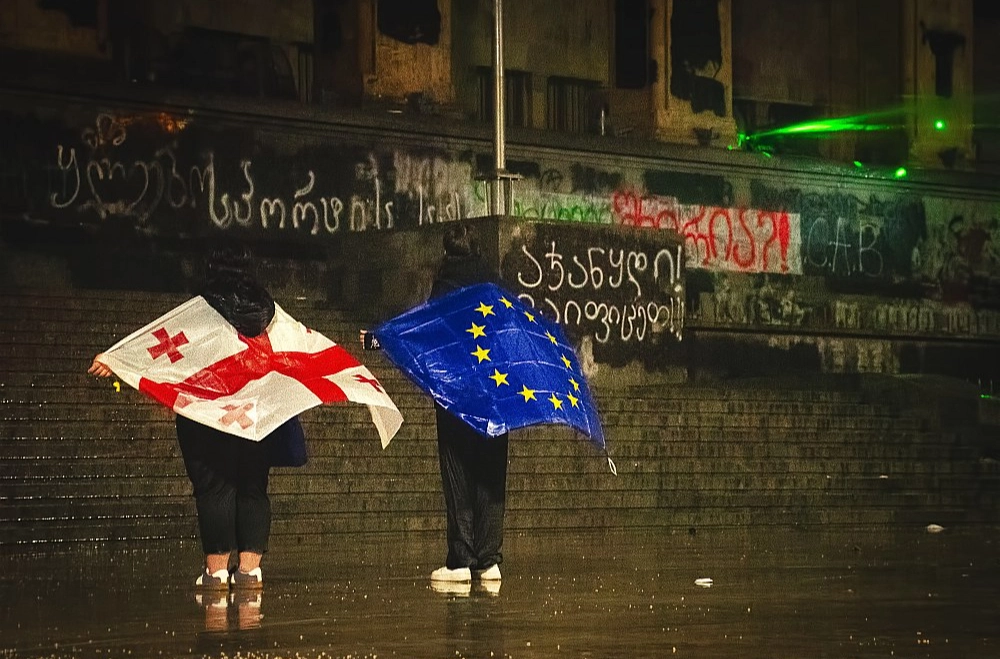
Artis Drēziņš/Latvijas Avīze. Tbilisi-Rīga
Going through what has been said about Georgia in the Latvian media over the last three years, apart from the wonderful tourism offers, the information has been almost entirely critical. Georgia refuses to introduce sanctions against Russia. Mikheil Saakashvili, former President of Georgia, a Western reformer, put in prison. A foreign agents and anti-minorities law is adopted. Georgia looks toward Russia, Moldova – Europe. Frozen reforms. The opposition is lacking leaders. Unstable political situation. Young people want to live the “European dream”, not the “Georgian dream”. Protests in Abkhazia. Unrest during elections. President reluctant to leave office. Rallies and protests after elections. Police violence against ralliers, with many imprisoned. Prime Minister Irakli Kobakhidze stops the country’s course towards the European Union and threatens to eradicate the liberal-fascist opposition. The US suspends its strategic partnership with Georgia. Latvia–Georgia parliamentary cooperation group suspended. Bidzina Ivanishvili, leader of the ruling Georgian Dream party, tries to destroy democracy and steer the country towards Russia. The Baltic states impose sanctions on a number of Georgian officials.
In January, Georgia disappeared from the news in Latvia, albeit ongoing rallies and protests.
On 29 January, the Parliamentary Assembly of the Council of Europe adopted a resolution calling on Georgia to hold new parliamentary elections, to release all political prisoners, and to take immediate measures to resume Georgia’s European Union integration process. In response to such Assembly resolution, Georgia has withdrawn its delegation from the Assembly. Looks like Georgia does not want the European Union after all, and has turned its back on it.
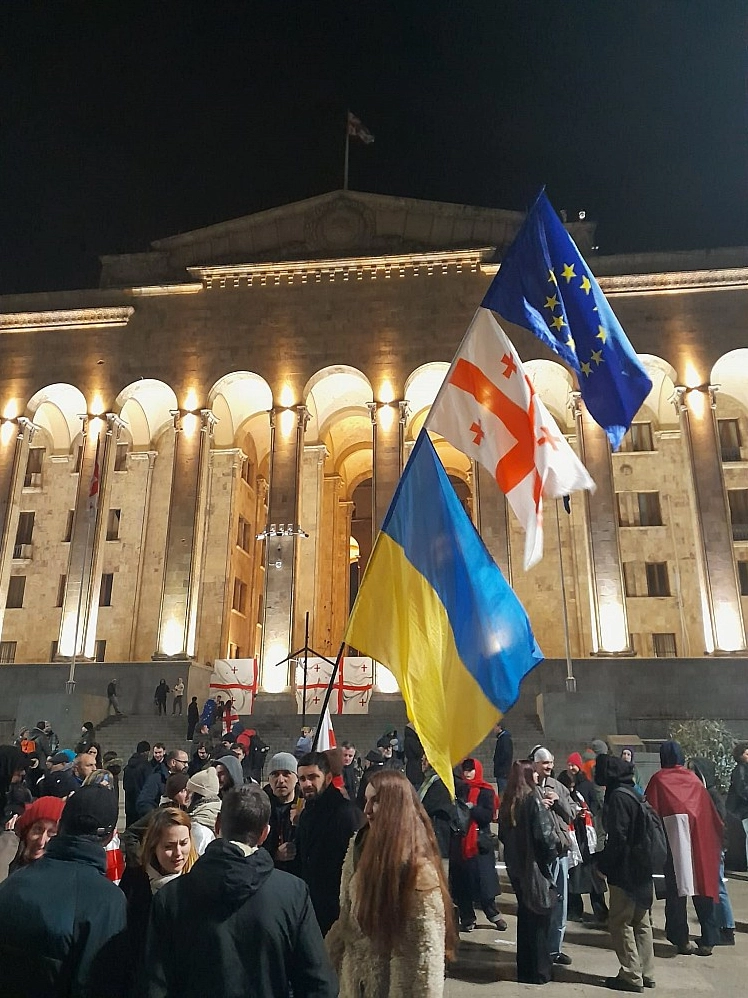
A bridge to the East
“You do not have complete information, let alone objectivity. A lot of things have been taken out of context. Georgia has not turned its back on Europe,” Professor Zurab Khonelidze, Rector of Sokhumi State University and President of the Georgian Academy of Education Sciences, tells me. “Yes, Georgia’s voice is not being heard properly, but there are reasons for that. They are not simple. The problem is with us because we have not been able to clearly explain our position. Our choice is not Europe, as many politicians say abroad and here. Europe is much more than that – it is our destiny. We are not choosing anything. Only a powerful and large country can make a choice. Many do not understand this, neither here nor abroad, they do not understand that Georgia is not only a part of Europe, but much more. And it is not just geography, it is values, too.”
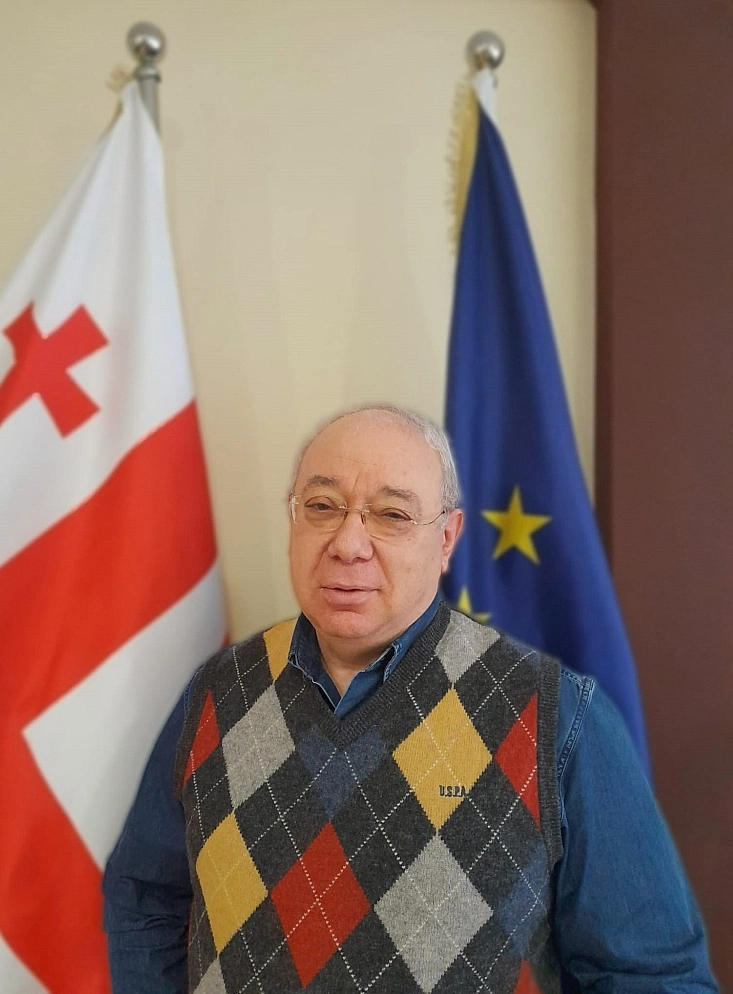
Photo: Artis Drēziņš
The Rector tells me that we need a philosophical and reasoning change in world views, we need to think strategically and see the bigger picture of what is going on and what globalisation is. We need to fight causes, not effects.
“Personally, freedom is the main value for me. My own, my nation’s and my country’s. Then justice and love – in the broadest meaning of the word. A belief in intellectual values that unite people who care about the values I have listed above. And for that to happen, geography is not important. We are more than a part of Europe – the cradle of civilisation. Religion and education are at the heart of Europe. Christianity and education centres arose in Georgia centuries earlier than elsewhere in Europe. This does not mean that we are superior to other European nations. This is not the comfort for Georgia, but a heavy burden and a great responsibility towards civilisation.
We are like a bridge to Europe, not a corridor to the East – Europe must be interested in this first. Like you.
Why, in the USSR, were our – then republics – relations the closest? We understood one another. We should not lose it,” continues Zurab Khonelidze.
The streets are safe, the Russian language is not loved
During the last days of January, I observed peaceful rallies outside the Parliament. Lots of policemen, vehicles with lights on also on nearby streets, but no loud excesses. The ralliers whistled and even played Marseillaise between the police vehicles in the middle of the street. I have no great illusions about Georgian democracy, but caricatures of the Prime Minister and the leader of the ruling party displayed unhindered in shop windows near the Parliament. I doubt if a mock portrait of our Prime Minister would stand in the windows in the Old Town for long…
I walked around the centre of Tbilisi at night and never felt endangered. Locals believe that Tbilisi could have the best physical security of any city in the South Caucasus, and even in the surrounding area.
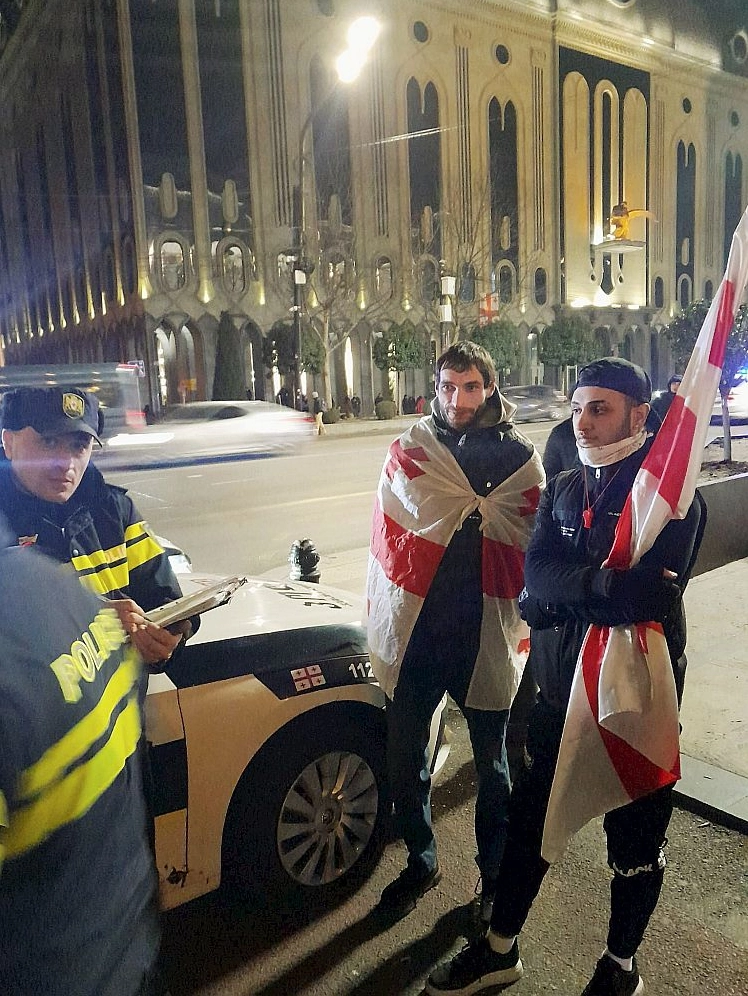
I did not see any Russian flags or other symbols, although I did hear Russian in the streets, but not loudly – as was common before the war, not only in Georgia but also in other countries. The attitude towards the Russian language is similar to ours – generally decent, but also hateful to some.
One taxi driver complained that there were so few Russians and so little income, that he wanted more Russians. Another taxi driver refused to take me because I said a few words in Russian.
The middle-aged and older generation is more judgmental towards Russian speakers, the younger generation is more European and aggressive, but, as I was told, there are not many loud expressions of hatred.
Georgia has also welcomed Ukrainian refugees – there are Ukrainian flags and signs in many places, and they also have their own meeting centres. In the hotel I stayed in, one of the staff members, a 21-year-old Russian, came from Russia to work, got a year’s exemption from conscription, will return home and join the army and, if ordered, will not run away from the war in Ukraine either.
Worldwide interests
University Rector Zurab Khonelidze does not want Europe to die, but unfortunately this process is already happening, including in Georgia. But where is the way out? It is expansion of influence, by which he does not mean new territories.
“Georgia can influence the situation in the South Caucasus so that it becomes an area of peace. That is our mission. Unfortunately, after the collapse of the USSR, our authorities did not understand that the world runs on interests and nothing else.
We are all more or less romantics, but politics has nothing to do with romance. We must be pragmatists to make things good and beneficial for all countries.
Who has interests in Georgia? Is it just specific countries, but perhaps international geopolitical centres, business corporations, financial centres? These interests must align with the interests of Georgia. There are major geopolitical changes happening now and no one knows exactly what the world will be like tomorrow, but it is clear that it will be a multipolar world where consumption rules. This is a trend that cannot be changed. Georgia can only understand the processes and preserve itself. We must be realistic about our history and not fool ourselves. Clearly, we do not want to be slaves and preserve our independence,” said the Rector.
Putting time and space together
After the collapse of the USSR, no Georgian leader has been able to put time and space together, to use the country’s vast geopolitical resources.
“I remember when President Zviad Gamsakhurdia who was the leader of the independence movement, came to power after the collapse of the USSR. At the time I was 26 years old and the first leader of an independent trade union. I have never met a more Georgia-loving and honourable man in my life than Zviad Gamsakhurdia, but in the end, both he and the country lost. When he came to power, Zviad Gamsakhurdia did not change the idea of independence, but began to implement it. A referendum was held and Georgia proclaimed its independence in accordance with all international laws. But a few months later, US President George H. Bush declared that Zviad Gamsakhurdia and Georgia were going against the flow and had no place in international politics.
What had happened then? What was happening in Georgia did not correspond to real politics. Yes, international law exists, but mostly in the books. It is the stronger one that is right, not the one who is truly right.
Former US President Richard Nixon, who had three informal meetings with Zviad Gamsakhurdia, flew to Georgia on special assignment even before the declaration of independence. I was present there, too. “You deserve independence, but there is no need to hurry. You will have independence. I will go to the USA, I will raise money to help you get on your feet. Play democracy, but do not hurry yet,” said Richard Nixon. We were not treated like the Baltics.
When Richard Nixon left, Zviad Gamsakhurdia declared that freedom was not for sale and that only dead fish go with the flow. At that time, the US wanted the former USSR to remain united. The fate that followed was tormenting for Georgia. There were two wars. We lost 20% of our territory, which was occupied by Russia. President Eduard Shevardnadze essentially took Abkhazia out of Georgia, while Mikheil Saakashvili, with the war in South Ossetia, then took Georgia out of the South Caucasus region. Western money helped to preserve Georgia and retain power. Why am I talking about all this now? Georgia is not alone in the room. It is in the South Caucasus, it is the Black Sea, relations with Russia, China,” says Zurab Khonelidze.
Georgian power controlling the situation
Now, Georgia’s fate is not being decided inside Georgia. A controlled chaos is being created from the outside. The Rector does not like many things about the current Georgian government, but if the forces that were in power with Mikheil Saakashvili – who also did a lot of good for the country in his time – were in power now, Georgia would long be at war with Russia and Zurab Khonelidze does not know what would be left of Georgia at that point. He sees that the current government is in control of the situation and that much of what is written about Georgia in the West is untrue or one-sided, for example on sanctions against Russia. There are sanctions, and Putin has also been recognised as a criminal at national level.
“The situation in Latvia was different, but you were also forced to take into account the geopolitical situation, you did not just play your own game. From the very beginning, Latvia, Lithuania and Estonia were perceived by the West as Western countries. You were saved by the secret part of the Ribbentrop-Molotov Pact on the Baltic States, which the Supreme Soviet of the USSR was forced to recognise.
At the same time, when Georgia took to Moscow the 1920 agreement between the USSR and Georgia recognising each other, we were told that this was not the way things were done, that our time had not yet come, that we had not yet reached an agreement with the West.
The US still wanted to maintain at least a common space in our region, but Georgia then started to act on its own. The USSR failed to survive, then the West invented the CIS – the Commonwealth of Independent States.
We will not solve our problems, particularly with the occupied territories, alone, and these are already problems for the whole region. Unfortunately, for the moment, the interests of the world’s leading political centres do not align. There is no political will to avoid conflicts here. Georgia alone will not manage. Moreover, this can only be done in a peaceful and diplomatic way, where new forms have to be found,” explains the Rector.
Without Europe, Georgia has no future
It is hard to disagree with the Rector that Georgia’s goal is independence, unity, prosperity, preservation of its identity and a guaranteed future. He emphasises that without Europe, Georgia has no future. The main thing he wants is for Europe to help Georgia to recover the occupied territories.
“Europe understands that we cannot recover the territories without Russia’s word, it can only be done peacefully, through negotiations. But why is Europe so critical that we are trying to talk to Russia?
Or that we want to go to war with Russia? Then Europe would come to our funeral and sympathetically say – what a nice nation and country, the Georgians were heroic and they were right. I do not want to lower my head with the others and I do not want to be pitied afterwards,” Zurab Khonelidze tells me at the end of the interview and firmly states: Europe does not completely understand us, but Europe is not going anywhere without us!
The Georgian Dream has bought voters
Zurab Papaskiri, Head of the Research and Development Department at Sokhumi State University, Doctor of History and Professor, disagrees with his Rector – a supporter of the Georgian Dream – on many issues and is a supporter of the current opposition. For example, he views Georgia’s geographical location from a political point of view negatively: there is nowhere to hide from the interests of the superpowers.
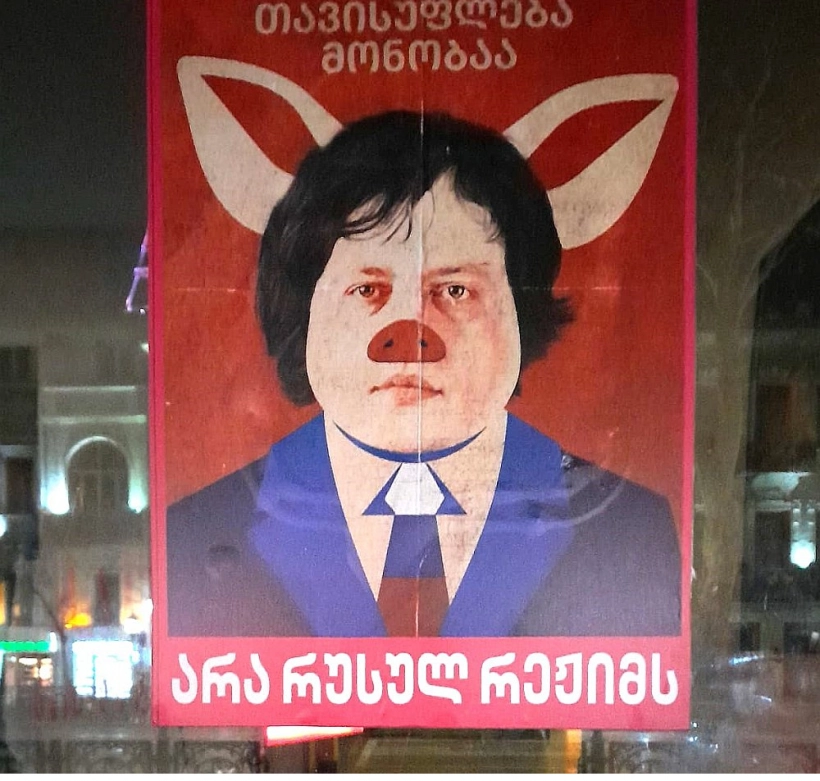
“At the moment, Latvia has one enemy – Russia. Apart from Russia, we have other countries that have their own interests here, such as Türkiye and Iran. Despite this, Georgia was firmly on the Western, European path for a long time: both during Eduard Shevardnadze’s time and especially during Mikheil Saakashvili’s. Now it is a disaster. Yes, Mikheil Saakashvili made mistakes, mostly during his second presidency. But he was a reformer. Colleagues in Azerbaijan still envy us for having had such a leader. Go to Azerbaijan – they are still in the Middle Ages, living in a Soviet style and mindset, despotism. Yes, the people there are no worse off than in Georgia, because Azerbaijan is a resource-rich country, but is that what we want?
The Georgian Dream came with Soviet thinking, but inertia kept it moving towards the West. Mikheil Saakashvili and his political force lost fair elections in 2012. He did not try to hold on to power by all means, as is normal for a Western politician.
However, I cannot forgive the nation for allowing the “dreamers” to come to power – they bought the voters with promises and at the same time it was a revanche of oligarchs and post-Soviet thinking,” says the Professor.
In Bidzina Ivanishvili’s first government, many ministers were strongly pro-Western, such as the foreign and defence ministers, President Salomé Zourabichvili was also an activist of the Georgian Dream, but now she is in the opposition and has ambitions to become the nation’s leader, with the major opposition parties supporting her. The Georgian Dream’s agenda was: Mikheil Saakashvili is a dictator, he can no longer be trusted with power, we will be democrats. Bidzina Ivanishvili built communism in his home village – he built houses for everyone, cleaned up the environment and made it clear that all of Georgia would soon be like that.
Power is traitorously moving the country towards Russia
“The Georgian Dream won even the next election. In 2020 there was already a serious rivalry in the elections, as many of Bidzina Ivanishvili’s followers realised that his path was leading Georgia back to Russia, although he never said this out loud and never will. When Russia invaded Ukraine, the Prime Minister said the very next day – look, we have kept the peace, but Ukraine is fighting – as if the Ukrainians were to blame – it was so blasphemous. Russia has always pressured us not to look towards Europe; it was always important for Russia to maintain its influence in the Caucasus. The Georgian Dream has never openly said that it wants Ukraine to win the war with Russia, only that peace must be achieved. But at what cost? Should the Ukrainians hand over their territory? Such an attitude of our government is a treasonous policy.
Yes, there is probably also fear of the Russians – their army in South Ossetia is only a few kilometres from the road and railway linking the west and east of Georgia, technically it is not difficult to do, and then there will indeed be huge problems. But the same Russians have a saying: if you are afraid of wolves, do not go into the forest.
Well, one can understand the fear, but why propagandists in Georgia are allowed to have power, who in the media pour mud on Volodymyr Zelenskyy, his government and the Ukrainians, is something that cannot be understood or accepted.
There are television channels on which people speak like Olga Skabeyeva and Margarita Simonyan on Russian television, only in Georgian. Can such a thing be tolerated in a country that hopes to join the European Union?” asks the Professor.
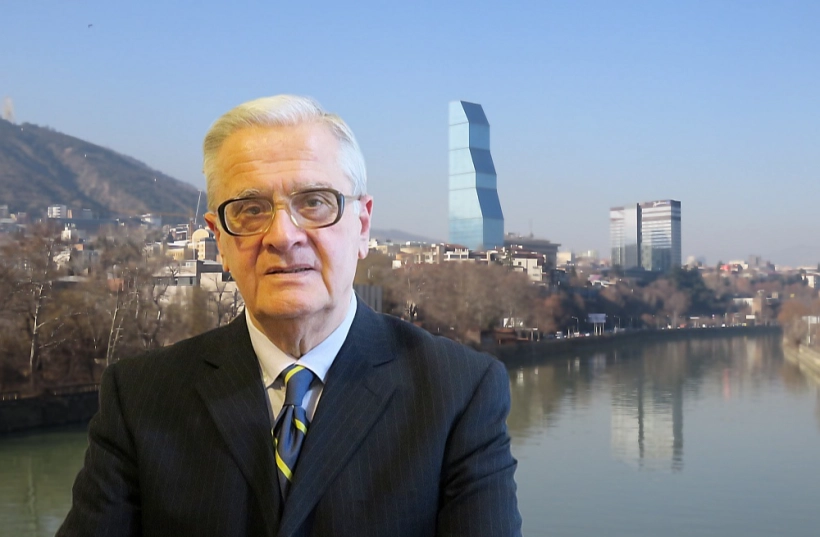
Photo: Artis Drēziņš
Zurab Papaskiri believes that the parliamentary elections were not entirely fair – especially in rural areas where people know each other, where people are intimidated and dependent on the existing government. We Latvians do not understand this because we are far from the Soviet way of thinking, even though we have a lot of Russian speakers. When he himself voted, he saw that at least two people were watching him and it was very clear who he had voted for, because the mark was visible through a piece of paper that had to be put in a special data reader. He, being an intelligent man, was unable to do this and was helped – what to say about people seeing such a technique for the first time, what anonymity can we talk about? And then everyone is amazed that in rural areas the Georgian Dream received over 80% of the vote, but in one of the central polling stations in Tbilisi, for example, only 38%. The Professor calls the processes now taking place in society a velvet revolution – if there were elections now, the opposition would get 70%. There are peaceful rallies, which the state can do nothing about, so they comfort themselves that the ralliers will get tired and the counter-protest will end on its own. The opposition is now fighting positionally, without active movements, and has refused to work in parliament, which reopened at the beginning of February – all this in unison with activities abroad.
To be continued…
